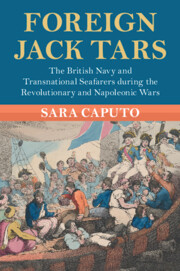 Foreign Jack Tars
Foreign Jack Tars Navy Crews as ‘Motley Crews’
from Part III - Displacement
Published online by Cambridge University Press: 03 November 2022
Chapter 7 reassesses our understanding of the social history of naval crews, by looking at their members’ degrees of geographical displacement. Being foreign ‘by provenance’, a transnational immigrant or refugee, conferred completely different weight and meaning to the terms of service: wages and victuals were evaluated by comparison with other fleets, and pensions and family remittances were only possible for those resident within British administrative reach. This chapter then reframes the historiographical debate on naval living and pay standards, situating the Navy in a transnational seafaring labour market. Some motivations for enlistment also elude the relatively neat dichotomy between ‘volunteer’ and ‘pressed man’ that has dominated British naval historiography: being ‘loaned’ by another monarch, or enslaver; escaping a British war prison, or enslavement; exile and contested loyalties. These personal circumstances only become visible when we look at Navy crews as ‘motley crews’, social and cultural mixtures of mobile and uprooted individuals often transcending the traditional image of the British ‘Jack Tar’, and very different from the modern model of citizen-serviceman. Labels of foreignness based on birthplace, subjecthood, or cultural difference were easily bypassed by naval efficiency and manpower maximisation, but the material aspects of social and geographical displacement were not.
To save this book to your Kindle, first ensure no-reply@cambridge.org is added to your Approved Personal Document E-mail List under your Personal Document Settings on the Manage Your Content and Devices page of your Amazon account. Then enter the ‘name’ part of your Kindle email address below. Find out more about saving to your Kindle.
Note you can select to save to either the @free.kindle.com or @kindle.com variations. ‘@free.kindle.com’ emails are free but can only be saved to your device when it is connected to wi-fi. ‘@kindle.com’ emails can be delivered even when you are not connected to wi-fi, but note that service fees apply.
Find out more about the Kindle Personal Document Service.
To save content items to your account, please confirm that you agree to abide by our usage policies. If this is the first time you use this feature, you will be asked to authorise Cambridge Core to connect with your account. Find out more about saving content to Dropbox.
To save content items to your account, please confirm that you agree to abide by our usage policies. If this is the first time you use this feature, you will be asked to authorise Cambridge Core to connect with your account. Find out more about saving content to Google Drive.